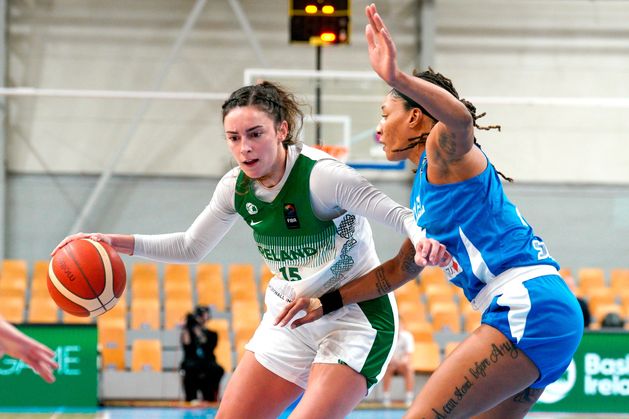Last February, they were criticised for facing the country the first time while it bombarded Gaza. And it was made worse by antisemitism accusations and their opponents being pictured with armed IDF soldiers.
But this second game largely went by without incident, which was partly by design.
Today’s ‘home’ game instead took place in Riga, almost 2,000km away from Dublin, and Basketball Ireland gave this fixture only brief coverage on social media.
The game could only be viewed on FIBA’s YouTube stream despite last April’s deal with TG4 to show Irish basketball games on its TV and online services.
Ireland’s loss to Latvia was on the broadcaster’s player on Thursday, but this Israel clash was not.
All of this made you wonder who the on-court advertising for the Irish association’s newsletter was directed at.
Certain things couldn’t be forgotten though. Before the match, Israel coach Sharon Drucker referred to how Ireland “did not respect” his players by refusing to shake hands with them last February.
He neglected to add that the Irish players had done so that time in protest at being called “quite antisemitic” by Dor Saar in a pre-match interview with the federation’s website.
Ireland denied the accusations and complained about the interview, which still remains on the site nine months on. Saar would play the sum total of 28 seconds this time around.
The night before this tip-off, the Israeli federation again referred to February’s protest, saying “similar things are expected” but it couldn’t be further from what happened this time in Riga.
After the players shook hands and the game tipped-off as normal, Israel would dominate throughout and led 46-31 at half-time thanks to their WNBA star Jennie Simms.
She would hit 17 of her 21 points by the midway point and it was at this stage that Basketball Ireland made their first acknowledgement of the game on X, posting the half-time score.
On the court, an understrength Ireland relied on the Massachusetts-born Bridget Herlihy, who scored 27 points, but they always struggled to bridge the gap here.
It didn’t help that they were again without several players who chose to opt out given their concerns over the conflict in the Middle East.
It’s something they won’t have to worry about in the next Euros qualifying window when facing France and Latvia again in the new year.
While any hope of making next year’s Euros may be gone, so too is this saga.

